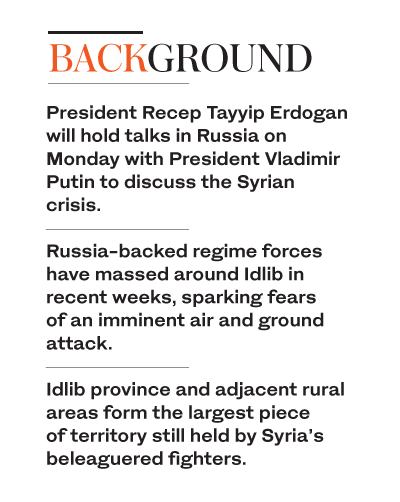BERLIN: Russian Foreign Minister Sergei Lavrov said on Friday that the Syrian regime is not preparing a major offensive against the opposition-held Idlib, adding that Moscow will do everything to protect civilians.
Russia-backed regime forces have massed around Idlib in recent weeks, sparking fears of an imminent air and ground attack to retake the last major opposition bastion.
“What is being presented at the moment as the beginning of a Russian-backed offensive by Syrian forces is not a faithful representation of the facts,” said Lavrov during a German-Russian forum in Berlin.
“Syrian forces and we ourselves are simply reacting to the attacks coming from the zone of Idlib,” he argued.
Lavrov also said that Russia was concerned about civilians’ welfare.
“We will take care on these issues, we will establish humanitarian corridors, set up cease-fire zones and we are doing everything to ensure that the civilian population would not suffer,” he said.
Idlib province and adjacent rural areas form the largest piece of territory still held by Syria’s beleaguered fighters, worn down by a succession of regime victories in recent months.
Humanitarian aid
Some 3 million people live in the zone now, about half of them already displaced by the brutal seven-year war and others heavily dependent on humanitarian aid to survive, according to the UN.
Recent hostilities have displaced more than 38,500 people in less than two weeks, said the UN, which has warned that a full assault on Idlib could create the century’s “worst humanitarian catastrophe.”
Turkey said it was talking to all parties in the Syrian conflict to prevent an offensive on Idlib ahead of talks between Russian and Turkish leaders.
Ankara failed last week to win agreement for a cease-fire from Russia and Iran, but there has been a recent lull in airstrikes and a pro-Damascus source indicated a ground attack may not be imminent.
The Syrian Observatory for Human Rights said calm mostly prevailed again on Friday.
Fighters also said some pro-Assad forces had left frontlines in northwest Syria in recent days.
Turkey has reinforced a dozen military posts inside the Idlib region, which lies across its southern border and is controlled by Turkey-backed fighters, trying to forestall a regime assault.
Foreign Minister Mevlut Cavusoglu said Turkey had also contacted foreign ministers of several countries and was in touch with “all actors in Syria.”
“We are making an effort for a cease-fire in Idlib,” he said, repeating Turkey’s call for targeted operations against extremists, including the Tahrir Al-Sham alliance, instead of an indiscriminate onslaught.
“We are ready to cooperate with everyone to fight terrorist organizations. But killing everyone — civilians, women, children — like this in the name of fighting terrorist organizations is not right and is not humane,” he said on a visit to Pakistan.
President Tayyip Erdogan will hold talks in Russia on Monday with Vladimir Putin to discuss the Syrian crisis, 10 days after similar talks in Tehran, Turkish and Russian officials said.
Despite the deadlock at the Iran meeting, calm has largely prevailed in northwest Syria this week following a wave of airstrikes which killed several dozen people and generated speculation of an imminent ground offensive.
A pro-Assad source in Syria said: “There is patience and repositioning currently. The operation is not canceled, but we have time.”
A second source, an official in the regional alliance that supports Assad, said there was a “political tug of war” over Idlib, accompanied by airstrikes on militants from Tahrir Al-Sham.
Two opposition sources in the northwest said some regime forces have been observed withdrawing from frontlines in the Hama region, which adjoins Idlib, this week.
“It appears that the Russians and the Assad regime have temporarily looked the other way,” said one of the sources, Col. Mustafa Bakour, a commander in the Jaish Al-Ezza insurgent group.
He added that several hundred pro-Assad forces had withdrawn from frontlines in the northern Hama countryside.

























